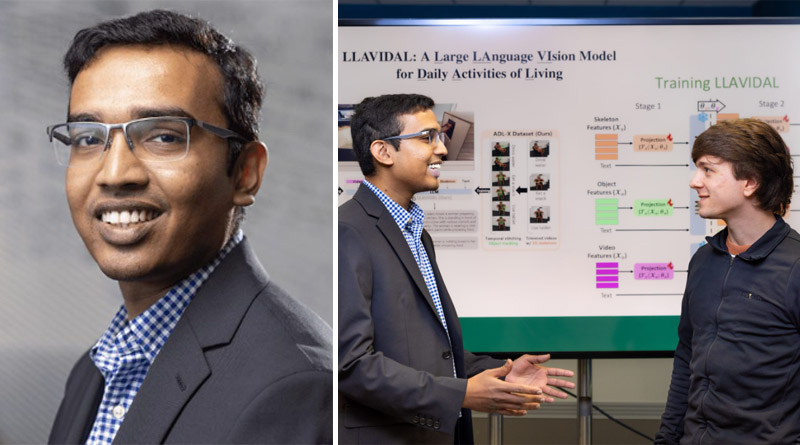Charlotte Professor Srijan Das Aims To Help Older People Live Longer
By SCHAEFER EDWARDS
Children depend on their parents to keep them out of harm’s way. Fast forward a few decades; as parents age, adult children often feel the responsibility to return the favor to make sure their elderly loved ones live safely and healthily while aging.
The shift from carefree child to concerned adult isn’t easy, even for those lucky enough to live in close proximity to their parents. For the millions of people who are separated from their parents by several hundred miles — or even oceans and hemispheres — staying connected is a major challenge.
Srijan Das, assistant professor of computer science in UNC Charlotte’s College of Computing and Informatics, has spent years researching how to program computers to analyze video information and quickly identify particular actions and behaviors of people. His aim is to use technology to help older people like his parents in India live longer, healthier lives, and reassure adult children that their loved ones are thriving while staying independent.
From early in his academic career, Das found fascinating the idea of “teaching” computers to see and understand the visible world as well as, or better than, their human counterparts.
One day in 2021, his academic pursuit became personal.
While working as a postdoctoral research associate at Stony Brook University in New York, Das received a phone call no child wants: His father’s health had taken a sudden turn for the worse. His dad was quickly admitted to a local hospital, but Das and his only sister were worlds away, both living in the United States pursuing their professional goals. His mother was alone to deal with the fallout.
Luckily, Das’s father recovered fully. His doctors determined that an imbalance in potassium levels caused by medications was the reason for his health scare.
Professor Srijan Das
Now, staring at his father’s mortality, Das felt doubt creeping in. His parents had always encouraged him to follow his dreams wherever they led. Had his decision to move thousands of miles away led to a near-death experience for his dad that was preventable had Das been there in person?
Das has now spent years conducting foundational computer vision research, from his time as a doctoral student at the French Institute for Research in Computer Science and Automation (INRIA) in Sophia Antipolis, France, to his stint at Stony Brook and since joining the faculty at UNC Charlotte in 2022.
In 2024, Das and his collaborators in the Charlotte Machine Learning Lab and the University’s burgeoning AI4Health Center developed an artificial intelligence-powered program that can interpret video data to discover and track human health-related behaviors with significantly more precision than other major AI models on the market.
The possibilities are as vast as they are exciting. With this new technology, computer scientists could potentially create an in-home recording system that analyzes video footage of people living in a given space that can be quickly translated by an AI assistant (think Apple’s iPhone Siri assistant or Amazon’s Alexa) to share timely, highly detailed health information in response to simple questions.
For example, physicians would be able to ask for evidence of tiny changes in a person’s gait or other movements to allow early detection of degenerative conditions like Alzheimer’s disease or Parkinson’s disease. Caretakers could be notified instantly if a nursing home resident slips and falls in their room — any time of the day or night.
And concerned children like Das with an elderly parent living far away could ask their new AI helper “Did my dad take his medicine?” and get an answer — and peace of mind — in seconds.

